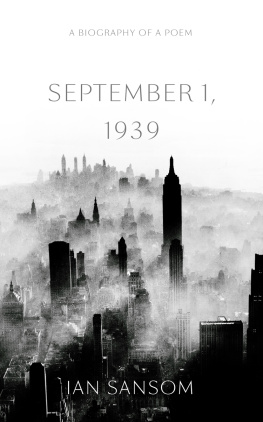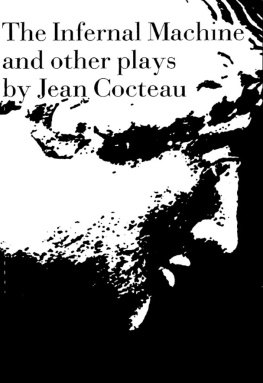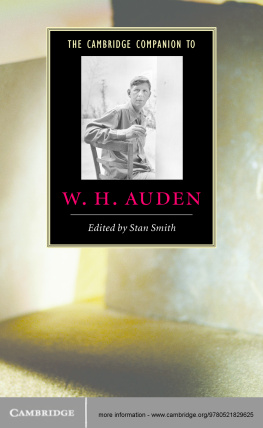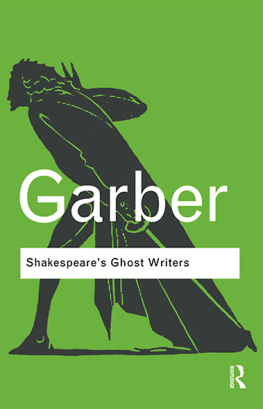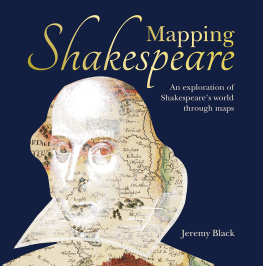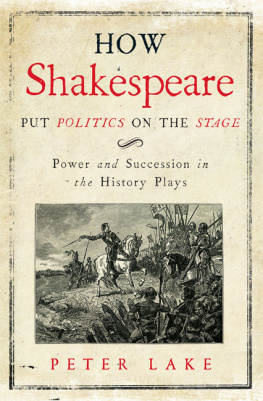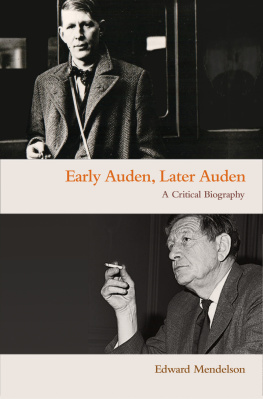Contents
Guide
Page List
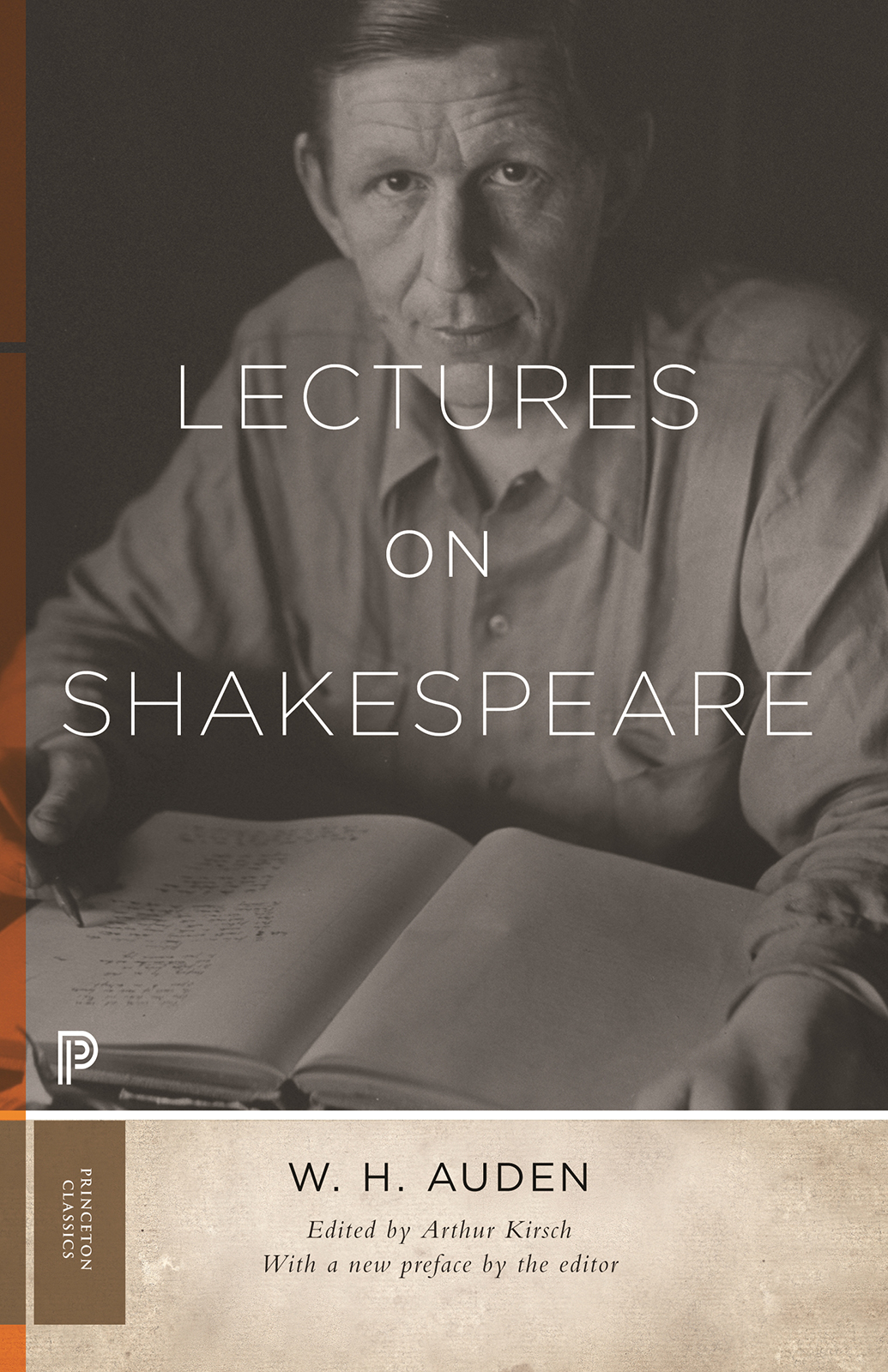
W. H . AUDEN
_______
Lectures on
Shakespeare
W. H. AUDEN: CRITICAL EDITIONS
GENERAL EDITOR
Edward Mendelson
Juvenilia: Poems, 19221928
Edited by Katherine Bucknell
Lectures on Shakespeare
Reconstructed and edited by
Arthur Kirsch
W. H. AUDEN
_____________________
Lectures on
Shakespeare
_____________________
RECONSTRUCTED AND
EDITED BY
Arthur Kirsch
With a new preface by the editor
PRINCETON UNIVERSITY PRESS
PRINCETON AND OXFORD
Preface copyright 2019 by Arthur Kirsch
Introduction and notes, copyright 2000 by Arthur Kirsch
Lectures and all writings by W. H. Auden,
copyright 2000 by The Estate of W. H. Auden
Not to be reprinted without permission
Published by Princeton University Press, 41 William Street,
Princeton, New Jersey 08540
Cover image: W.H. Auden, ca. 1946. Photo by Jerry Cooke/
The LIFE Picture Collection/Getty Images
All Rights Reserved
Fourth printing, and first paperback printing, 2002
First Princeton Classics paperback printing, with a new preface by the editor, 2019
Paperback ISBN 978-0-691-10282-5
eISBN 978-0-691-19795-1 (e-book)
Version 1.0
Library of Congress Control Number:2019944458
CONTENTS
vii
ix
xiii
APPENDIX I
Audens Saturday Discussion Classes 321
APPENDIX II
Fall Term Final Examination 341
APPENDIX III
Audens Markings in Kittredge 347
APPENDIX IV
Example of Text Reconstruction 363
PREFACE
When Audens lectures on Shakespeare were delivered at the New School in New York in 194647, they caused such a sensation that one member of the schools staff is reported to have said it was almost as if Shakespeare were giving lectures on Auden. The lectures truly do represent a confluence of Audens genius with Shakespeares.
Auden said that judging a work of art is virtually the same mental operation as judging a human being, and requires the same aptitudes: first a real love of works of art, an inclination to praise rather than to blame, and regret when a complete rejection is required; second, a vast experience of all artistic activities; and last, an awareness, openly and happily accepted, of ones own prejudices. Auden brought these aptitudes to Shakespeares plays in abundance and with massive intelligence.
Auden was suspicious of criticism as the literary genre which, more than any other, recruits epigones, pedants without insight, intellectuals without love; and in The Dyers Hand he writes, There are people who are too intelligent to become authors, but they do not become critics. He remarks that good literary critics are rarer than good poets or novelists, because a poet or novelist learns to be humble in the face of his subject matter, which is life in general, whereas a critic must learn to be humble to individual human beings, and that is much more difficult: It is far easier to sayLife is more important than anything I can say about itthan to sayMr. As work is more important than anything I can say about it. Auden argues that Shakespeares cardinal virtue is that he never takes himself too seriously, and Audens lectures on his plays share that humility.
Audens own experience as a dramatist and writer of libretti inhabits the lectures and most distinguishes them. He says in a lecture on Pericles and Cymbeline, for example, that in these last plays Shakespeares interest turned to relationships among characters rather than individual passions and states of being, as in the major tragedies. To depict these relationships, Shakespeare created Mrchen fairy-tale plots that are difficult for professional actors to perform, because it is difficult to get actors and actresses to forget their audience. The parts have to be done in a completely absorbed way, forgetting the audience. The plays suffer more than any of Shakespeares other plays if the feminine parts are taken by women. It is fatal to have the parts done by great actors and actresses. They are best done by school children with a Svengali director.
Auden says of Antony and Cleopatra that, it wont do as a movie at all. The play is exclusively about human history and the effects of human will. There is no background showing farmers ploughing fields, there are no conflicts between human beings and nature, no storms. The play is concerned with the desire for world dominance. Movies emphasize particular localities and their uniqueness. In a movie scene of Ventidius in Syria (III.i), for example, Auden continues, you would see too much particular Syrian scenery. But what is important is the contrast with the immediately preceding scene on Pompeys galley. A movie again would emphasize the particular furnishing on the galley, but it doesnt matter if its a galley or a house. What matters is the view it presents of the lords of the world in undress, in contrast to the scene of Ventidius and his troops guarding the frontier. Space is the prize, and not any corner of space, but the whole of civilization.
In contrast, Auden says that King Lear needs the resources of a motion picture to represent the plays meaning properly. In King Lear, he explains, the storm is not the macrocosm of inner passion, though Lear would like it to be. The storm is without passion, and pays no attention to who is just and who is sinful. The storm goes its way, but Lear remains the same. Lear taking off his clothes presents a contrast between the human animal and civilization. We need both the storm and green fields as contrasts to Lears feelings and there is a contrast between human passions and a weak body: we must see that. Lear goes mad and sees amiss: the audience must see what is really there. A realism is required, Auden concludes, that the stage cannot give. King Lear is the one play of Shakespeare that, in the storm scene, really requires the movies. Most movies of Shakespeare may make you want to say, its very nice, but why must people say anything? You want to see everything. If I agree with those who dont want to see King Lear on stage, it isnt because I dont think it is dramatic, but that, as it contrasts itself with the speakers, it should be presented as real. Auden adds, Also, the battle in King Lear frees one from the idea that battles are won by the good instead of the strong. This is a profoundly unsuperstitious play. I do not agree that it is a nihilistic or pessimistic one. Certain states of beingreconciliation, forgiveness, devotionare states of blessedness, and they exist while other peopleconventionally successful peopleare in states of misery and chaos.
The meaning of the excruciating suffering in King Lear has been debated by critics for centuries, but Audens comprehensive and strikingly unsentimental view of it may be the wisest. It has affinities with his luminous religious depiction in his poem Muse des Beaux Arts of the human position of suffering in everyday life,
how it takes place
While someone else is eating or opening a window or just
walking dully along;
How, when the aged are reverently, passionately waiting
For the miraculous birth, there always must be
Children who did not specially want it to happen, skating
On a pond at the edge of the wood.
even the dreadful martyrdom must run its course
Anyhow in a corner, some untidy spot
Where the dogs go on with their doggy life and the


